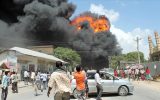There has been a lot of propaganda around the rash of ethnic and economically driven killings that have spread across the Nigerian Middle Belt. At the very forefront of this humanitarian crisis is Benue, which on January 1st 2018, was at the centre of a maelstrom of violence that left 100 people dead. Propaganda and differing statements have obscured the actual events of that day, and moved the focus away from the itinerant communities at the heart of this massacre. Investigative journalist Patrick Egwu travels to Benue’s communities to follow the violence and shine a light on the victims ignored by Nigerians and vilified by government.
These are their stories.
BENUE MASSACRE II:

Laadia Udum, whose younger brother was killed by raiding Fulani Herdsmen
BENUE, NIGERIA – Strapping Dapuun, her one-year-old daughter on her back, Laadia Udum, 33, recounts the attacks by the herdsmen she personally experienced and how her younger brother was killed in their family farm.
When Orshi Udum, 15, went to the farm at the back of their house to harvest Guinea corn, he thought he would return to meet his eight other siblings. Instead, his corpse was returned after the herdsmen attacked and killed him during one of their unprovoked raids.
“He went to the farm to harvest Guinea corn and had packed them inside a bag to take home when the attacked happened,” Udum says, swivelling her baby into the crook of her arms and urging her to latch onto and breastfeed. “They were firing into the farmland and my brother got shot in the leg. He tried to run but the pain crippled him and he started shouting for help. They followed the sound of his voice, found him and killed him,” she tells me, staring at Dapuun, who nurses quietly at her side.
During the mass burial of 73 of the victims in Makurdi on January 12, Udum tells me she felt the overwhelming urge to join her brother in the grave.
“I wanted to join him inside the grave during the burial,” she confesses, overwhelmed with emotion. “I feel lifeless whenever I see his younger ones that look like him, I start to cry. Anytime I see someone who wears the kind of clothes he liked to wear, I feel sad and want to cry.”

Aoyondoma Kaven 43, had to bury his sister after she was killed by herdsmen
“She went back to look for foodstuff in our house when they (herdsmen) came and killed her,” Kaven Aondoyima, 43, said of his younger sister who was also killed in the attacks.
“They destroyed our farm where we cultivate rice, soya beans and yam. We are left with nothing now,” he says folding his hands in akimbo while nodding his head.

The Gbajimba camp for IDP’s, a local government primary school converted for this purpose
Sordid situation in camp
Mgande and other villagers fled their homes – leaving their farms and livelihoods for a refugee camp. The January 1 attacks caused a refugee crisis in the state. At first, they gathered at different spots – markets, open spaces, under mango trees, streets and churches until some youth in the community mobilised to organise a makeshift shelter to house them until the tension calms down and peace returns to the affected villages.

Sunday Nyichie, one of the six volunteers who protect IDP’s at Camp Gbajimba
“They were seen roaming everywhere without direction, without anywhere to go until we found here for them,” 31-year old Sunday Nyichie, one of the community agents who secured a temporal location for the displaced villagers, tells me waving back at one of the Internally Displaced Persons (IDPs) who was waving at him.
One of such shelters secured for the villagers is the Central Primary School, Gbajimba in Guma where Mgande and more than 1,000 other IDPs are currently staying as refugees. The school with 6 classroom blocks, houses them, their livestock and belongings.
At the camp with 1,743 IDPs according to data obtained from the Benue State Emergency Management Agency officials, I observed squalid and sordid living conditions with poor hygiene. The displaced villagers sleep on raffia mats in classroom halls, without mosquito nets and share rations of food from metal pots and plates in a dirty environment.
Aside the Gbajimba camp, five other camps were opened for displaced persons in the two affected local government areas in the state. In Guma, three camps – Daudu, Gbajimba and Tse-Ginde accommodate more than 10,000 villagers while Anujiiu and Ugba camps in Logo local government area houses more than 5,000.
Mothers and their young girls were seen cooking with firewoods in open fields as the men helped out in getting firewood and fetching water for the kitchen. Children as young as 2, 3–5 years gather in clusters – playing with sand and making mini-houses with sticks, brooms and fresh mango leaves and dancing round in the open field – under the scorching sun.
Two children – Uzi, 6 and his friend, Ogor, 7, who were holding hands and leaning on a bamboo tree in the open field, smiled at me, almost asking to be photographed. Their innocence overwhelmed me and I approached them for a shot. Soon after, other children who were watching as I took the shot, swarmed around me – pulling at my camera and knapsack, wanting to have their own photographs taken.

Mary Ngewa 44, shares a meal with her family
“Come and eat,” Mary Mgewa, 39, tells me with a smile as she shoos the children away. She shares a bowl of meal with her mother and children and it is from this meagre allowance that she intends to feed me as well. “This is how we do it every day. Sometimes we eat once, then on a good day we enjoy two meals,” she explains, wiping her mouth clean with the back of her left hand.

A tuberculosis sign hangs outside Camp Gbajimba’s makeshift medical outreach centre
“We are basically here to look at the nutritional status of the children and do some hygiene and sanitation activities,” says Jennifer Oko, team leader of Benue Non-Governmental Organisation Network (BENGONET) – an NGO working in collaboration with other NGOs in the camp to assist victims. “The camp is always littered and we try to sensitise them on hygiene and open defecation. They are just destabilised at the moment which is why they live like this.”

Jennifer Oko, team leader of BENGONET, who provides rudimentary medical care for the IDP’s at camp Gbajimba
What she doesn’t want to tell me is that limited resources mean that even among the children, only priority cases will get the attention every child here needs.
At the camp clinic, I saw mothers in front of the hallway leading to the entrance door, clutching their sick children – breastfeeding them and waiting for their turn to see the doctor.

Medical staff at Camp Gbajimba’s medical centre, they are often overwhelmed by cases of malnutrition among the children of the camp
“We opened this clinic one week ago to treat the injured and sick ones,” Godwin Gbawuan, a caregiver at the camp clinic tells me. “UNICEF and the ministry of health supplied us with some drugs we are using at the moment,” he flips through a file, walks me through the donations the clinic has received from several non-profit organisations.
“The major problems we are having here is cough and abdominal pains among the IDPs because of change of diets, and malaria too because of mosquito bites and inadequate places to sleep. We refer difficult cases to Makurdi or the general hospital over there,” he says, referencing to the General Hospital in Guma.

At night, Nyichie and the other five community agents patrol the camp, checking the perimetre to make sure nobody intrudes without an official permit.
Mgande tells me she feels safe here.
“I am fine here because they protect us,” she says referring to Nyichie and his team. But she wishes her husband were around. “I think of my husband always. I wish he was here with us,” she says, glancing in the direction of two of her children who were standing at the far side of the hall watching us.

Camp families wait for daily rations.
Amidst protests, relief came
Two weeks after the attacks, the villagers received information that the herdsmen had returned and were currently grazing their herds at Tse-Yorde, another village in Guma despite the presence of both the military and police. Spurred by fear, hunger and frustration, the community agents summoned courage and sent a spy to confirm the reports of the return of the herdsmen.
On reaching the villages which are hours away from the camp, the spy didn’t see the herdsmen but observed hoof prints – an indication of a freshly grazed area. Immediately, he returned and delivered his report to the community agents.
“We got information that they had returned again to graze in the same area where we were attacked,” Nyichie confirms. “We are shocked that they returned despite all that they had done to us. I telephoned the army and police who were deployed to protect the community but they said they didn’t see any herders. It was hard to believe.”
When Eunice Ortom, the wife of the governor alongside other governmental officials visited the camps to donate food items and relief materials, some of the villagers, numbering about 500, protested saying they wanted protection for their lives instead. As she spoke in the camp’s open field, some youth under a big shady mango tree jeered while some booed prompting her security detail to approach them for calm.
Yet, they continued. Even calls for calm by Anthony Shawon, the chairman of Guma local government area was ignored by the protesters.
“We want protection of our lives and our community and not political statements,” Vin Ndom, one of the villagers who was standing few metres away from me barks angrily followed by cheers from others standing close to him.
“How can they be talking about other issues when our life is at stake here?” another queried.
“Their presence here is not useful to us. We need protection. That’s all,” Tyoor Gwatse, the council head of Guma tells me. “The police are not here so they act on their behalf.”
Read the previous instalment in this series:
The real victims of the Benue Massacre I: “First, they slit his throat”















